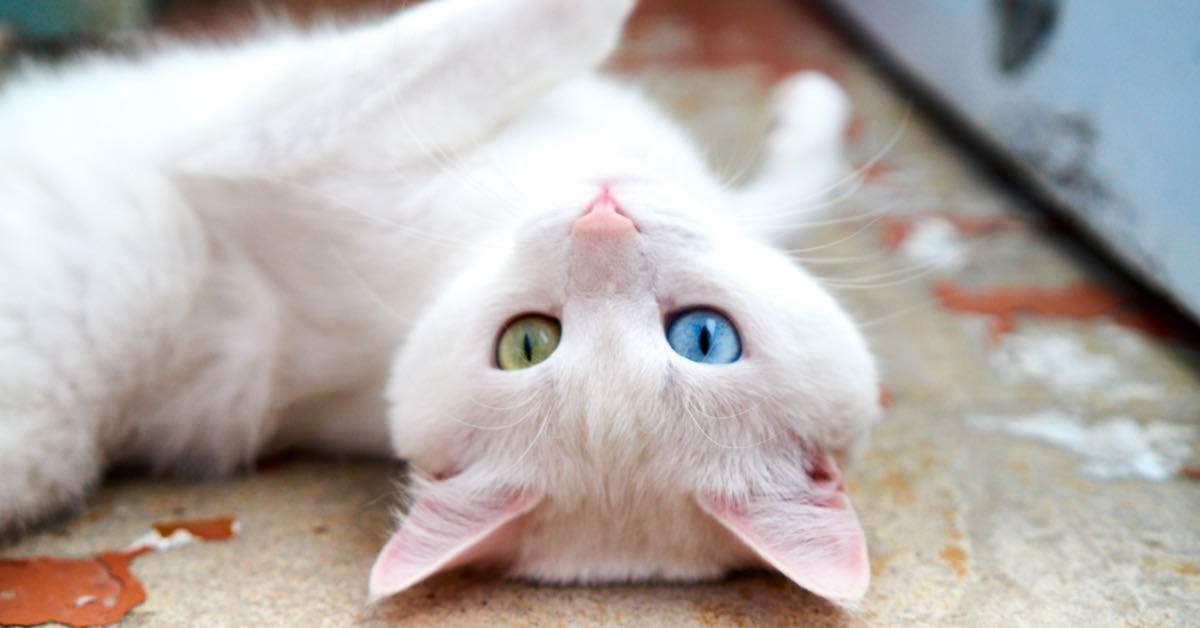Key Points
- Cat DNA tests are a fun way for pet owners to learn more about the genetic makeup of their pets.
- Some genetic tests focus on potential health concerns, while others focus on breed composition.
- Genetic tests are relatively easy to perform at home; however, because most cat breeds are less than 100 years old, information is limited.
Does your kitty “talk” to you, bring you “gifts” from the outside world, or snuggle up in your lap while purring like a motorboat? Those endearing personality traits may have a genetic basis that pet owners can discover through a cat DNA test.
Dog DNA testing has been around for a while, but demand for cat genetic tests is rising. The best cat DNA tests can offer valuable information about your cat’s breed composition, genetic makeup, and potential health issues. You can have fun learning about your pet’s ancestors and possibly even keep them happier and healthier.
Whether you’re a cat breeder or just a curious cat lover, this guide will help you find the right cat DNA test for you. We’ll also provide a quick download on how these genetic tests work, what you can and can’t learn, and why you might consider one for your kitty.
Why should you test your cat’s DNA?
In addition to the fun of learning more about your pet, the benefits of cat DNA testing include:
- Identifying your cat’s breed, which can provide insight into their temperament, lifespan, and behaviors.
- Learning about your cat’s heritage, including where they came from and their closest wild cat relatives.
- Finding genetic markers to discover potential health conditions for your pet as they age.
The top 5 cat DNA tests
A few companies currently offer at-home cat DNA tests to pet owners. The most well-known is Basepaws, which provides a breed analysis and health DNA test, a whole genome sequencing test, and an oral health testing kit.
Here’s a brief rundown of the best cat DNA tests on the market today:
1. Basepaws Breed + Health DNA Test
Who it’s for: Cat parents who want to identify their cat’s breed or learn more about their rescue or mixed-breed cat.
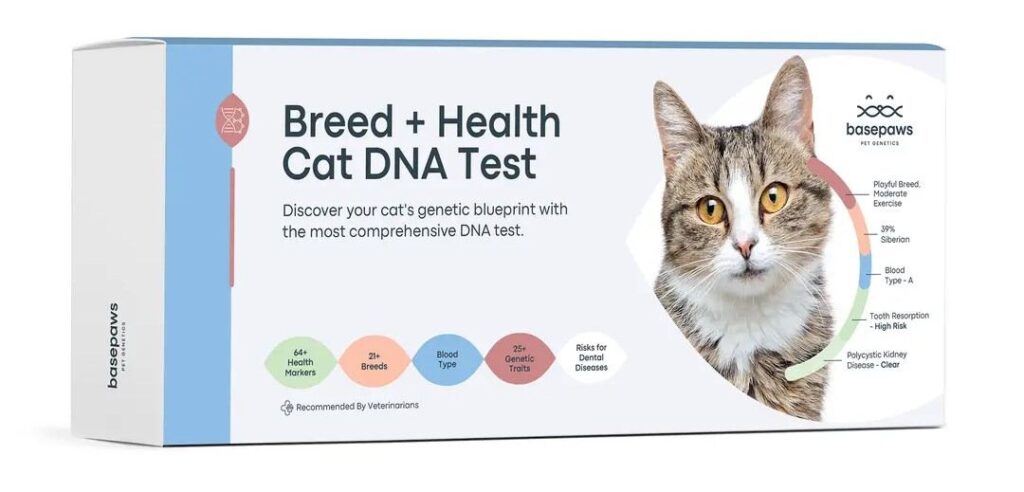
- Breeds Screened: 21+
- Health Markers: 64+
- Traits: 114+
- Blood Type: No
- Cost: $159
Basepaws participates in numerous research studies to help cats stay healthy and happy. Pet owners rate their genetic tests very highly on Amazon. The Basepaws Breed + Health DNA test compares your cat’s DNA sequence to other cats to provide information about:
- Your cat’s breed and breed group connections
- Genetic markers for potential health risks
- Genetic traits similar to various wild cats
2. Basepaws Whole Genome Sequencing Test
Who it’s for: Cat lovers who want to leave no genetic stone unturned; breeders and pet parents looking for the most comprehensive cat DNA test.
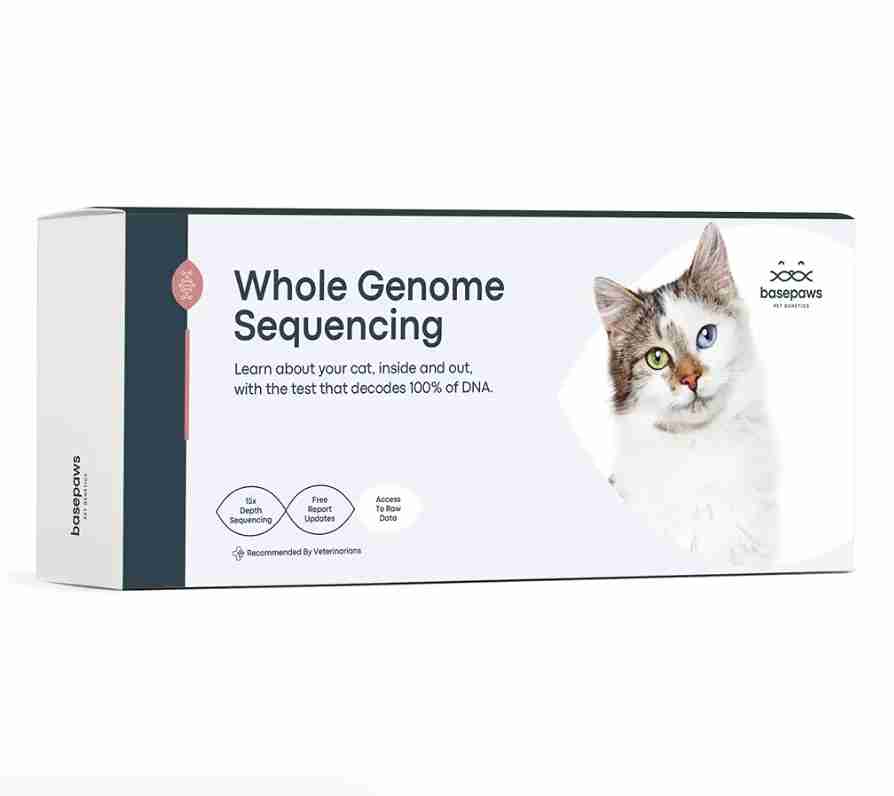
- Breeds Screened: 21+
- Health Markers: 114+
- Traits: 25+
- Blood Type: Yes
- Cost: $499
The Whole Genome Sequencing test lets pet owners see their cat’s complete genetic information, and Basepaws says it provides up to 10,000 times more data than other DNA tests. It also provides unlimited updates as Basepaws continues to add new traits and genetic markers, a unique feature of this test.
Overall, the Basepaws cat DNA test is the most popular option on the market for pet owners. The Whole Genome Sequencing test is expensive, however. If you’re not ready to spend that much, you can opt for the Breed + Health test to learn more about breed type and genetic conditions.
3. Wisdom Panel Complete For Cats
Who it’s for: Cat parents looking for a more affordable at-home pet DNA kit.
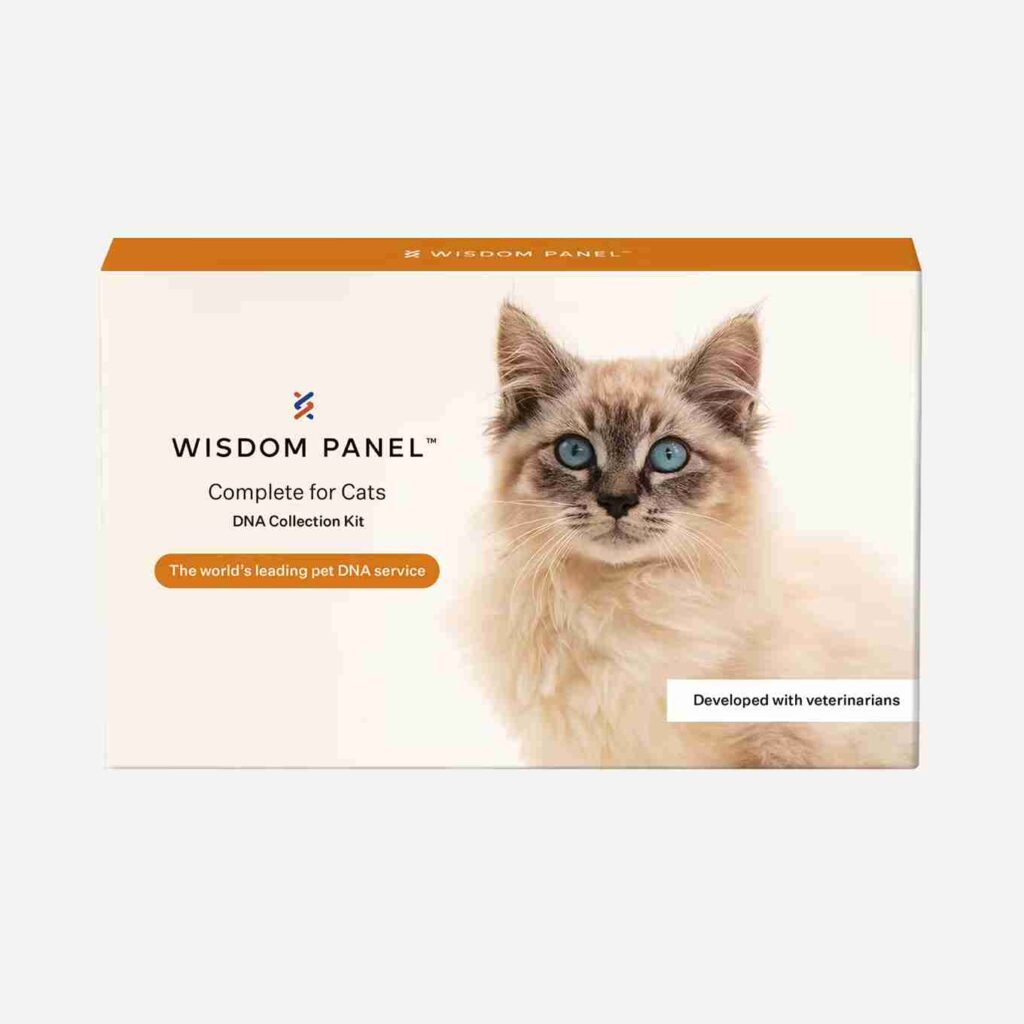
- Breeds Screened: 70+
- Health Markers: 45+
- Traits: 25+
- Blood Type: Yes
- Cost: $129.99
Wisdom Panel has spent more than two decades developing DNA testing to give pet owners the most precise picture of their pet’s genetic makeup. Wisdom Panel has a team of pet geneticists designing their DNA tests and licensed veterinarians to help pet owners understand test results.
The Complete for Cats test kit looks at more than 45 health markers and 70 possible cat breeds. This test also gives pet parents insight into their cat’s physical features and unique personality traits.
4. Wisdom Panel Optimal Selection by Wisdom Panel
Who it’s for: Looking for cat DNA tests for breeders? This Optimal Selection kit was designed for cat breeders who want to screen for specific genetic markers and possible health problems.
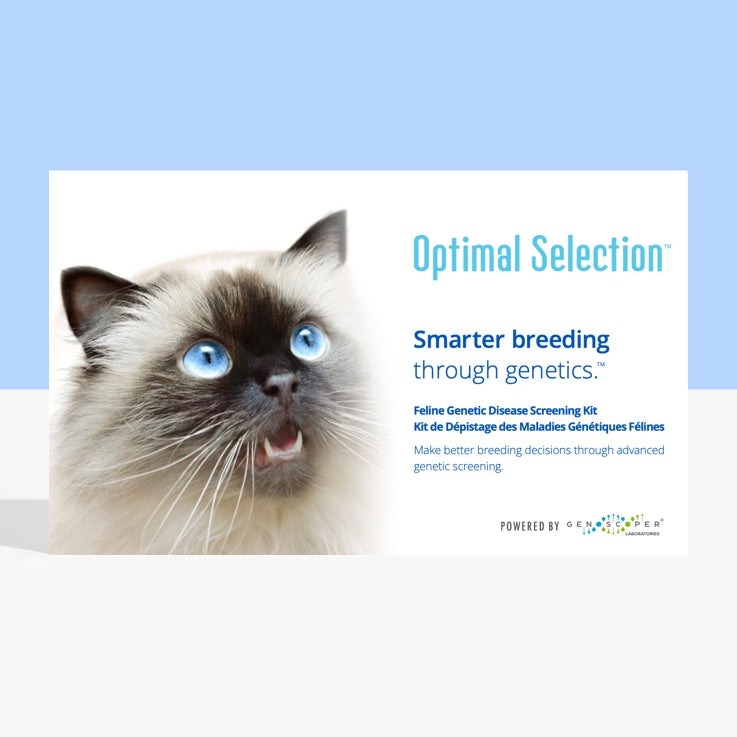
- Breeds Screened: Full genetic footprint
- Health Markers: 45+
- Traits: 29+
- Blood Type: Yes
- Cost: $148.99
Optimal Selection is the breeder-specific division of Wisdom Panel. The Optimal Selection Feline cat DNA test can be used for pedigree or mixed-breed cats. It checks for health markers and physical traits while providing a unique genetic footprint of your pet.
Although Wisdom Panel designed this test for breeders, it can provide useful health information and interesting data about your cat’s physical traits and blood type.
5. Orivet Feline Full Breed Profile
Who it’s for: Cat parents who already know their cat’s breed but still want to learn more about them; people looking for breed-specific genetic markers.
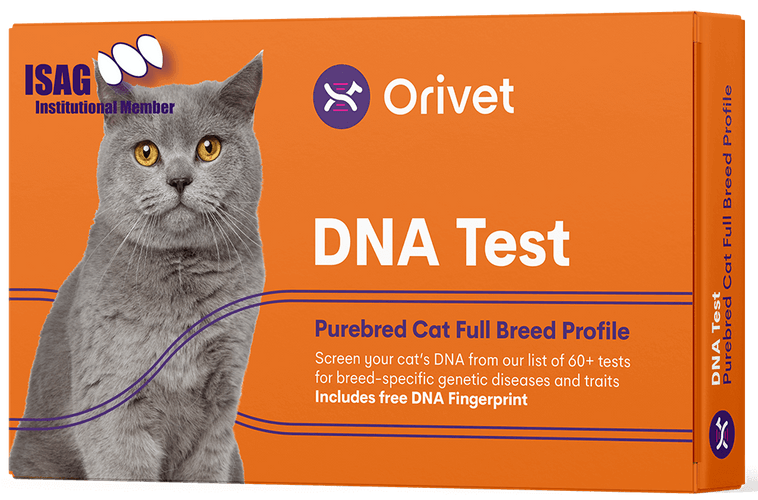
- Breeds Screened: N/A
- Health Markers: 25+
- Traits: 12+
- Blood Test: Yes
- Cost: $119
Orivent is a global pet genetic testing organization with a line of DNA tests for dogs and cats. The company offers the Cat Complete Health & Trait Screen for cat owners, which is completely focused on genetic diseases and other health concerns. The company has more than 60 breed-specific tests, so it’s a smart choice if you already know your kitty’s breed.
It will give you a risk analysis for genetic health conditions based on your cat’s genes, breed, age, weight, and gender. You can use this to make a wellness plan for your cat. This test is a great option if you already know your cat’s breed and want to look for breed-specific health problems.
How do cat DNA tests work?
All the DNA tests listed require the same process to administer the test and receive your results. First, order a test from the manufacturer or an online retailer like Amazon or Chewy.
Once your DNA test kit arrives, go to the company’s website to create an online account for your pet and register your test kit. Remove the swab and rub it on your pet’s inner cheek for a few seconds to collect a DNA sample. Secure the cheek swab in the provided pouch and send the sample back to the company for testing.
Most companies tell you when your samples are received and when the results are ready on their website. This may be around 2-6 weeks after the samples are sent.
If you purchase Basepaw’s Whole Genome Sequencing test, you’ll also receive periodic updates from the company when new research results are available.
Cat DNA tests and your cat’s breed
Some cat DNA tests can tell you about your cat’s breed and family history. However, these results are not as accurate as dog DNA tests. The reason? Dogs have been bred for specific tasks for thousands of years, and we have a lot more genetic information to understand various breeds and traits.
Cats have a much more muddled ancestry since most breeds are less than 100 years old. These animals were also bred randomly based on appearance, rather than other characteristics. Despite the limitations, these tests can offer some interesting information about your pet, including:
- A breed analysis that shows how your cat’s chromosomes are similar to different breed groups.
- A wild cat index that shows your cat’s genomic similarity to different wild cats.
- A list of feline breeds to provide additional information about different breeds that contribute to your cat’s heritage and personality.
- Risk factors for many genetic diseases so you can proactively care for your pet.
Cat DNA testing is not perfect, but it can give you interesting information about your cat. This information can include why they might be so vocal or cuddly.
Cat DNA tests and your cat’s health
Cat DNA tests that focus on health look for markers of common feline diseases caused by genetic mutations. The test will indicate whether your cat has any mutations present in their DNA to alert you to potential risk factors.
These tests look for diseases such as polycystic kidney disease (PKD), which is often seen in Persian cats, and hypertrophic cardiomyopathy (HCM), which is often seen in Ragdolls and Maine Coons.
To be clear, these tests can’t tell you if your cat has a disease. They also can’t say for certain whether or not your cat will get a disease, only that they may be more prone.
These DNA tests can be used as preventative tools, especially if you’re planning on breeding your cat. They can also be used to help you create a plan for your cat’s health, as long as you consult with your veterinarian about your results. Don’t forget that Cat DNA testing is a new science, and the technology is still evolving. The information you receive, even from the best cat DNA test kit, may be limited.
Learning about your pet’s potential health risks is just the first step. Cats can get themselves into all sorts of mischief, and you never know when an injury or accident will occur. A Pumpkin Cat Insurance plan can reduce the cost of eligible vet bills in the future, giving you peace of mind.
FAQs
DISCLOSURE
Disclosure: This post contains affiliate links at no additional cost to you. We may earn commissions from Amazon or other vendors through these links. As an Amazon Associate, Pumpkin earns commissions from qualifying purchases.
